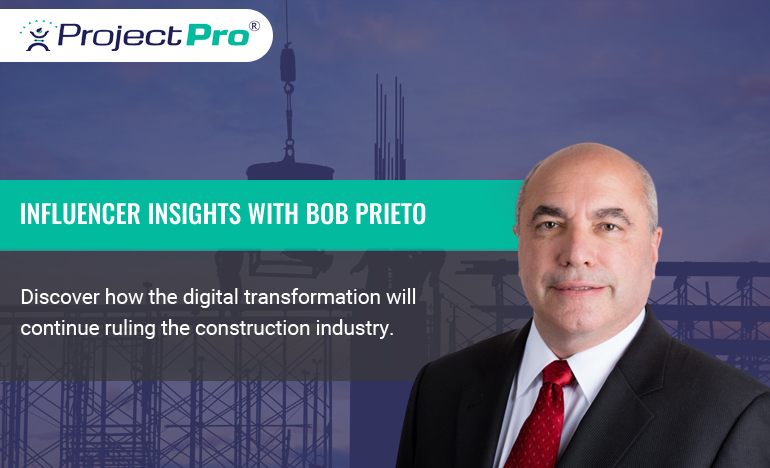Interviewed Bob Prieto to Gain Insights into the Intricacies of Construction Technology
The construction industry is experiencing a digital revolution due to advancements in technology. There are numerous instances of how modern technology is revolutionizing the construction sector.
Construction firms are utilizing various technologies, such as artificial intelligence (AI) and the internet of things (IoT), to eliminate entrenched inefficiencies and increase productivity. The growth of construction is being propelled by novel technology.
Many are moving towards partnering with technology providers to grow in the construction industry.
To shed some light on the same, we interviewed Bob Prieto to gain his insight into the same:
Who Did We Interview?
Bob is the CEO of a renowned construction related program management firm, a Member of the National Academy of Construction, and a recognized leader within the infrastructure, engineering, and construction industries. He is a board-level executive in shaping and executing business strategy.
Bob’s industry involvement includes the ASCE Industry Leaders Council, National Academy of Construction, and Fellow of the Construction Management Association of America (CMAA), and he served on the Millennium Challenge Corporation Advisory Board.
He serves on New York University Polytechnic School of Engineering Department of Mechanical and Aerospace Engineering Advisory Board and New York University Abu Dhabi Engineering Academic Advisory Council and previously served as a trustee of Polytechnic University.
Let Us Quickly Get To Our Expert’s Point Of View.
Question 1: How do you see the construction industry in the year 2023? Do you think this year will be a "digital year" for construction professionals?
While I think 2023 will become a digital year for the construction industry, I think that statement requires some perspective. First, "going digital" will no longer be a differentiator. It is now a market expectation.
There will be leaders and laggards, but the digital shift is underway. In some sense, it is similar to the industry shift to desktop computers or CADD.
Second, we are underutilizing the power of the technology available due to a combination of factors beginning with a lack of challenge by owners, many of whom see it as a cost adder rather than a value creator.
The industry has always performed best when challenged by changes in owner demands, crises/disasters, or regulations. Other factors include the nature of contracts that chop a single project into multiple pieces both at the CAPEX stage and the separation of OPEX thinking from the earliest stages of CAPEX thinking.
Today's BIM models must continue to shift to digital twins and, ultimately, life cycle asset management models. All must become more triple-bottom-line focused as well.
Question 2: The construction industry has undergone dynamic changes over the years. What do you consider as the biggest challenge for this industry now?
The biggest challenges for the construction industry over the years have been safety and productivity. We have made progress on safety but still, have far to go.
Productivity, on the other hand, has lagged in improvement compared to other economic sectors. In large part, the challenge is driven by the "bespoke" nature of most projects.
Shifts to more pre-assembly and modularization move parts of the project into a more efficient manufacturing environment, but there is much scope for improvement. But by far, a much more fundamental challenge exists, namely in managing the delivery of large programs and projects.
In simple terms, project management theory, as we practice it, is failing the industry. How we got here is a much longer conversation, but in simple terms, we lost sight of some of the drivers of very successful projects, perhaps even "codifying" some of the wrong conclusions about their success.
Question 3: What potential do you see in the latest construction technology trends? Are they capable of boosting the productivity of construction professionals?
Technology is an enabler, so yes, it will largely have a positive impact. But for broader and deeper changes in productivity to occur, there needs to be a systemic shift along the entire construction value chain.
Many factors work against that happening, and real systemic innovation and productivity improvement aren’t happening.
The impeding factors include both a lack of alignment at each step in the value chain as well as a lack of alignment, focused on ultimate value creation, along the value chain. It will take a strong, concerted shift in one or more industries to break down these barriers.
Historically we saw these imperatives arise with the creation of a nuclear power supply chain and capital efficiency needs in the oil & gas sector. Similar, broad industry drivers are not as apparent today.
Question 4: Where do you see the construction industry in the next five years? Please share your valuable insights with our readers.
Sadly, I see the industry as not as successful as I believe it could be given the talent, energy, and commitment of the countless numbers that participate in it both directly and indirectly.
We will continue to make incremental improvement and celebrate it, but all along, we will know how much is possible but suffer from an ability to effect the broad systemic change which I mentioned and which I believe is essential to the future of our industry.
Our industry is ripe for an external disrupter – Google, Tesla, or Player to be Named, who does not yet exist.
Get to Know Our Influencer
Question 5: In four words or less, what's your prediction about the transforming construction industry?
Great expectation, slowly realized!
Question 6: What's your success mantra?
Vision, Focus, Drive.
More Details
Bob is an author of nine books and over 900 other papers and presentations who prides himself on a strong, continuing focus on creating and sharing knowledge within the profession. He is also an inventor on four issued patents.
Bob consults with large, complex capital asset program owners to develop programmatic delivery strategies encompassing planning, engineering, procurement, construction, financing, and enterprise asset management.
He was appointed as an honorary global advisor for the PM World Journal and Library.





